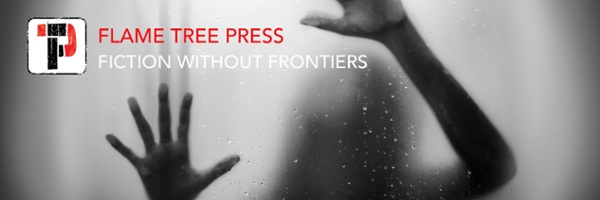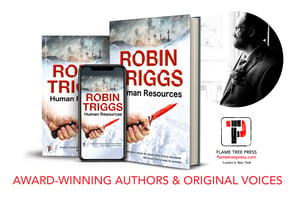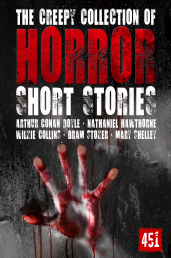In the next of this month's Q&As with our November authors, we have Robin Triggs, author of Human Resources, sequel to Night Shift. He discusses how writing a sequel differs to writing a standalone novel and what his literary influences were! Be sure to check in tomorrow for more writing inspiration!

Do you write in silence or with a soundtrack?
Always with music! Silence is too loud.
Music is hugely important to me. I always wanted to be a musician – I was a drummer and vocalist – but eventually realised that I lack the necessary charm and talent to make it.
Nothing fires my imagination like a good song. The way the mood is created, the feel that burns through, to which the singer gives only the ghost of meaning. My very first adolescent scribblings were inspired by Bowie in particular, filling the gaps in the lyrics with my own interpretations. I graduated to prose-writing after spending years writing lyrics of my own.
What were your literary influences?
I was raised on classic science-fiction. My mum read me Andre Norton when I was a child, and her influence can be seen throughout Human Resources. That, along with BBC Saturday night shows like Doctor Who, The Tripods and Blake’s Seven, shaped me more than anything else.
Other key writers include Philip K. Dick – the best ideas-man there’s ever been – and, more recently, Neil Gaiman. I missed out on the classics of literature as I was growing up so I’m trying to catch up with them now, but there are so many wonderful writers around at the moment that it’s hard to keep up.
I do, however, read a lot of non-fiction. History especially, but also science and philosophy. Ideas are always thrilling, especially if they challenge cherished beliefs or give new perspectives. I call myself a writer of speculative fiction because I’m always asking things like ‘what if that’s true? What will that mean for society?’ Or, equally, ‘what if that’s wrong?’
Who else has influenced your writing?
My mother is my biggest influence, although that’s cheating slightly as she’s a writer too. She read to me every day until I was fifteen. Through her I moved from The Three Investigators to the Pullein-Thompson’s to Lord Peter Wimsey to Piers Anthony and so, so many others.
Then Bowie took over. I got into writing prose through lyrics; through exploring the moods they created and all the things they didn’t say, the emotions visited but never made explicit.
Now my biggest influence is my wife. Not only does she act as a scientific consultant (she’s a biologist) but also acts as a sounding-board and encourages me to push on when I’m struggling.
How does writing a sequel differ to writing a standalone novel?
I’m not sure as I don’t know if I’ve ever written a standalone. Even as I was getting on with Night Shift I had in mind that there were more stories to tell of this world and these characters.
I guess the difference is that, in a first novel, you have the freedom to create – or change – any circumstance you like. Don’t like the way the world is shaping up? Simply change its parameters. You can’t do that in a sequel: the rules are set, hard and fast. Of course, I’ve cheated somewhat by changing the mining base of book one to a city in book two. So my parameters rewrote themselves in a way of my choosing.
Some things are harder. You have a responsibility to maintain – or exceed – the standards you set in the first novel, and that’s not easy. You have to come up with a plot that keeps to the tradition of the first novel, whilst being completely new and original. You have to reveal more about your central character, and you have to do all this whilst assuming that your reader hasn’t read book one. It’s devilish tricky – sometimes you have to say the same thing as you did before but find an entirely new way to do it.
Human Resources is very much based on people – Australis is a city of immigrants and refugees and the problem of what to do with all these people is a theme that runs right through the book. To what extent was that deliberate?
There is a Douglas Adams quote that ends with the punchline: people are a problem. This was in my mind throughout the writing of Human Resources and, in a way, it’s what the novel is all about. What do we do with people who need to eat but can’t – for economic and technological reasons – do any useful work? Do we create a class of drones, or do we turn off the machines and give them pointless makework?
Add in a personal vendetta, a rogue black-ops team and a group of political dissidents and the story writes itself! (Except it doesn’t; this is perhaps the most difficult story I’ve ever attempted to write, perhaps because I felt these big themes needed to be got right.)
Human Resources is unusual in that the protagonist is unsure of himself and constantly second-guessing. Was this a conscious decision?
I’ve always been drawn to accidental heroes. It’s the ordinary, the underdogs amongst us that I find more compelling and believable. Perfection is so dull!
Anders, the protagonist of Human Resources, arrived almost fully-formed in my head and I guess that means there’s a lot of myself in there. I spent a lot of time and many drafts thinking about his history and backstory and how he ended up in Antarctica at this particular time, in this particular world. How did the events of the first novel, Night Shift, affect him as a person? Has he faced his demons or acquired new?
My personal feeling is that Anders is suffering from a depression that may be a symptom of post-traumatic stress disorder. He’s awkward and self-conscious, worrying too much about how others perceive him, about doing a ‘good job’ (whatever that actually means), where he’d be better off just relaxing and being himself.
I don’t have all the answers, though; the readers are free to interpret my words in any way they want. Writing’s a partnership, not a dictation.
What does it feel like to have your work read by strangers?
A novel is an intensely personal thing. Writing involves stitching little pieces of yourself onto the page. Even the best-intentioned, kindest criticism can make you feel like your soul is being drawn out and the harsh light of failure shone upon it.
The writer is in every single word that’s set down, and that’s why they need to be thick-skinned. It’s a fine line, though, as they can’t be so hidebound that they can’t accept the advice they need to improve. I’m no different from many writers in that I’m a mix of unbearable arrogance and critical insecurity.
All this is why anyone who wants to write should join a writing group. Get used to taking criticism in a safe environment and to pitching your own (constructive) criticism to the right level. There’s no point ripping a reticent first-timer apart: save that for the person you know can take it – and needs it.
Do you prefer writing to editing? How much time do you spend on each?
I enjoy both. They’re different challenges, with different frustrations. ‘The first draft is just you telling yourself the story’, as Terry Pratchett said. It can be slow, it can be painful; there are locked doors and diversions and secret paths and it always takes longer than you expect. You might end up in a place you never expected to be.
Editing is all about taking that lump of pig-iron and beating it, heating it, beating it again until it’s a rapier-sharp blade. In my experience it takes longer than the initial writing. Human Resources, for example, took only a few months to draft and then several years to polish. New characters and new complexities were added, unmotivated actions removed, and then the wrong words chased into corners and starved until they withered away.
Knowing when to step away is perhaps the hardest thing about writing. Us writers could spend eternity staring at a single paragraph. But there’s always something new to write
How much did the book change over the course of the writing?
Oh, a huge amount. The only things that really stayed the same were the setting and the overall plot. The characters changed – including a penultimate-minute addition – motivations shifted, romances came and went. That’s the wonder, the joy of writing. A novel is a puzzle: you set out all the pieces, lay them in order and try to link them together only to find that that they’ve transmogrified whilst your attention was elsewhere.
This novel in particular put up a real fight; I don’t really know precisely why but I had to work really hard to get all the pieces into place. I don’t think I’ve been through as many drafts with anything else I’ve done: each brought me a little closer to a story that sang the song I envisioned when I started. Just about everything changed except for the essentials stayed in place: the people and the environment. That’s what this novel is about.
Do you have a favourite character? Is there anyone you dislike, or had difficulty writing?
Bartelli, the police sergeant, is a joy to write for. I don’t know what it is about him – he’s another of these characters that just arrived almost fully-formed when I needed him: a scruffy, shuffling exterior that hides a sharp mind and a dry wit. In a lot of ways he’s the story’s hero, working alongside Anders to uncover the truth. He’s one of those people that just brings a smile to the writer’s face whenever he’s in a scene. And he’s only in the book at all because I needed someone to bulk out the cast.
Another significant character was the environment. Or, rather, the two environments: the interior and the exterior. Inside the city the feel is close, warm and claustrophobic. Outside, in the wastes of Antarctica, we have the frozen wilderness – a vast, agoraphobic emptiness. I really hope I managed to create this contrast, to make them as ever-present and ever-threatening as the monsters that lurk under the bed.
Q: Human Resources is set in the near future when resources are running out and a single all-powerful Company runs much of the world. How did you go about devising the global background to the story?
A: Human Resources is a classic ‘what if’ question: what will the world look like if things continue they way they’re going? It’s not a utopia, nor a dystopia – just difficult. Too many people, not enough land and not enough resources. So humanity is forced into the margins: the mountains, the wilderness, the oceans.
In truth I came up with the story first and then tried to work out what sort of global background afterwards, though before I ever set metaphorical pen to paper. Then the background in turn influenced the story. These things are always recursive: the story affects the background which affects the story… Eventually, if you’re lucky, you’ll reach some sort of equilibrium and a novel emerges.
What are you writing now?
Many things! Human Resources is the second in a planned trilogy, so I’m busy on book three. It looks at potential revolution and how the isolated nature of the city might work against the all-powerful Company – and the way the unscrupulous might take advantage of that.
Plus it seems that someone has a vendetta against Anders and wants him dead…
I’m also working on something totally different – a modern fantasy where the world is under attack from the land of dreams: Monsters Inc as written by Stephen King.
Thank you!
Thank you to Robin for taking the time to talk today about Human Resources. You can pick up his book, along with the other November releases now. It will be available in paperback, hardback and ebook. Check out our website for details.
 Rob was raised in Bradford before heading, at eighteen, to the bright libraries of Norfolk. Music was his main interest at this time. He played drums and sang whilst writing copious amounts of lyrics, some of which tipped over into the vaguely-defined realm of poetry. In 2003 he made the top 500 of the Dublin International Poetry Competition.
Rob was raised in Bradford before heading, at eighteen, to the bright libraries of Norfolk. Music was his main interest at this time. He played drums and sang whilst writing copious amounts of lyrics, some of which tipped over into the vaguely-defined realm of poetry. In 2003 he made the top 500 of the Dublin International Poetry Competition.
He studied archaeology in Queen’s University, Belfast before returning to Norfolk and starting to write seriously. He received a boost when he moved to the middlest of middle Englands and joined Abingdon Writers’, a fantastic group that were quick point out all his writing sins. He was Chair for a spell but abdicated as soon as decency allowed.
When not writing he studies the past: archaeology and the historic landscape remain passions. He’s also an exceptionally poor cricketer, turning out for The Bodleian Library’s collection of misfits. He did, however, once bowl Sebastian Faulkes.
At the Bodleian he tells tourists that yes, Harry Potter was filmed here, but no, they can’t go inside. He also works as a proofreader.
A freshly-minted father, he spends his time changing nappies, Tweeting and – when the opportunity presents itself – doing the odd bit of creating. He keeps a blog - www.robintriggs.wordpress.com - of assorted writerly ramblings. You can also find him on Twitter @RobinTriggs.
Make sure you check back in with the blog for more Q&As with the authors of our October releases!
- FLAME TREE PRESS |November Releases | 1 | Kenneth Bromberg Q&A
- FLAME TREE PRESS |November Releases | 2 | P.D. Cacek Q&A
- FLAME TREE PRESS |November Releases | 3 | Robin Triggs Q&A
- FLAME TREE PRESS |November Releases | 4 | Andrew Post Q&A
- FLAME TREE PRESS |January Releases | 5 | Upcoming Titles




